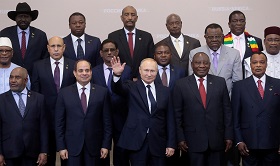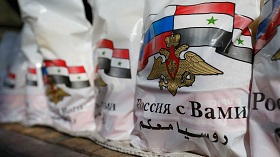Yevgeny Primakov, the Russian politician and journalist, has been appointed the head of Rossotrudnichestvo, an agency promoting Russia's humanitarian policy, following a decree signed by Vladimir Putin. Future changes in humanitarian policy embodied by Rossotrudnichestvo are thought to create a more favorable regime for Russia in the world arena along with more solidarity.
In order for that to be the case, Russia’s humanitarian policy needs a fundamental review. In recent years, trends that may serve as an impetus for necessary future changes have emerged. The first innovation concerns the functioning of organizations promoting Russia's international policy and the assessment of their performance. The second determines their regional focus.
Russian-African relations have enough opportunities to play a prominent role in efforts to promote Russia's humanitarian policy. Russian humanitarian policy needs a fundamental revision at the functional and regional levels. At the operational level, this is expressed in closer cooperation with NGOs and digital technologies to work more effectively on the ground. Through interaction with the regions, the importance of Africa has increased. For Russia, this is a promising area for promoting humanitarian values such as peace preservation and justice. In this regard, Rossotrudnichestvo is perhaps the primary tool for implementing Russian humanitarian policy.
Thus, changes in Russia's humanitarian policy abroad are expected with the appointment of the new head of Rossotrudnichestvo. Humanitarian policy needs to be revised both functionally and in interaction with the regions. Russia has historically promoted such values as peace preservation and justice. Based on the tendencies and intentions of Mr.Primakov, there is a potential for cooperation with local NGOs. After analyzing the discussions on the humanitarian topics of the SPIEF for 2017-2019, two more trends are emerging. In addition to working closely with the community, there is a need to use digital technologies. This will allow Russia to work not from organization to organization, but from organization to individual. The coronavirus pandemic has pushed Russian education towards cyberspace, which will allow more to receive it. These are precisely life, health, safety, the level of women's participation in solving global problems that are the goals of humanitarian policy, Russia can and knows how to work on them. In connection with the strengthening of interaction in the Russia-Africa direction, this region is clearly coming to the fore for Russian work. It is the region, like no other, that needs peace preservation and justice. So why shouldn't Russia satisfy the external demand having the resources to do so?
Yevgeny Primakov, the Russian politician, and journalist has been appointed the head of Rossotrudnichestvo, an agency promoting Russia's humanitarian policy, following a decree signed by Vladimir Putin. Primakov is the successor to Eleanora Mitrofanova, who led the department since December 2017. Future changes in humanitarian policy embodied by Rossotrudnichestvo are thought to create a more favorable regime for Russia in the world arena along with more solidarity.
In order for that to be the case, Russia’s humanitarian policy needs a fundamental review. In recent years, trends that may serve as an impetus for necessary future changes have emerged. The first innovation concerns the functioning of organizations promoting Russia's international policy and the assessment of their performance. The second determines their regional focus.
As for the revision of the functional features of Russian institutions of humanitarian policy, the necessity to work with NGOs on the ground and use digital technologies seems crucial. Firstly, clarification of the country's priorities in the field of humanitarian policy could turn useful. Drawing attention to modern power diffusion from state actors to non-state ones, Russian institutions may concern themselves with Russian humanitarian projects' effectiveness and motivate Russian donors and actors to be more focused on practical work "on the ground." A shift from only international level cooperation to cooperation on supranational and subnational levels could ensure Russia's influence and, as a result, a more favorable treatment.
The further issue is effectiveness. With specific humanitarian projects, this means that institutions could improve the situation of the population, communities, and households — only such an effect can and should be a criterion for the effectiveness of the humanitarian policy. Along with official channels, the implementation of this mission requires a more active involvement stemming from the non-governmental sector, namely the media community, and Russian business companies conducting foreign economic activity. It is a search for common ground, universal themes, and areas of interaction in which public opinion abroad (non-governmental organizations, communities) in the future could become a decision-making center for the development of joint dialogue and mutual understanding. In conditions of high uncertainty, digital technologies could have a positive effect on more efficient work.
When it comes to reorienting the regional foreign policy of humanitarian diplomacy institutions, the African continent appears as a priority. The humanitarian policy includes the promotion of humanitarian values. Historically, Russia defends such humanitarian values as peace preservation and justice. Considering the current power transition among states (and it's moving from West to East and stronger cooperation North-South), Russia could be perceived in international affairs as a guarantor of peace. Consequently, the second apparent humanitarian policy shift is developing more adequate approaches in several areas and regions. The most relevant policy directions for Russia are the countries of the former USSR, the Middle East, the Asia-Pacific region, Africa, and South America. The last two are considered to be resource centers as well as business hubs that if successfully overcame (concerning Africa) problems such as mass hunger and the spread of diseases, could become a field of activity for Russian companies' interest, and contribute to the development of humanitarian initiatives. These humanitarian initiatives should not be taken as a thing-in-itself, initiatives just for existing initiatives, but rather as a useful tool, providing new employments, further education, and better life opportunities.
The change in the humanitarian agenda is visible on the example of topics within the SPIEF. The SPIEF is an annual Russian business event in the economic field, which has been held since 1997. The Forum's key mission is to be a practical tool for business, allowing to overcome the barriers that divide Russia and other countries, both geographical and informational. If we look at the previous discussions' development in relation to the humanitarian agenda, the movement toward the shifts has already begun. Further analysis covers humanitarian issues discussed at the St. Petersburg International Economic Forum 2017-2019. The Forum has been attended by senior officials of international organizations, representatives from around 140 countries.
Since 2017, the Forum has been showing the need for interaction with NGOs. The topics of discussion of the Forum 2017 covered corporate social responsibility programs, the implementation of humanitarian initiatives, and the public sector's cooperation with NGOs. The two messages leading the meeting were: any investment project needs a humanitarian component. The costs borne by the state will primarily lead to an improvement in other’s people lives, their health and safety.
The SPIEF-2018 was more focused on "work on the ground initiatives," as well as with their performance evaluation. In this regard, coordination at the international level alongside the public sector's active participation in overcoming the obstacles of the agricultural sector of countries is necessary. Going beyond the scope of symbolic activities, corporations make a significant contribution to the implementation of programs aimed at improving the social situation, the quality of life, the provision of humanitarian and medical care services, as well as combating epidemics. Moreover, the state and business's interaction reduces the risks of natural disasters, but the market underestimates the effectiveness of investments in security. In this regard, state bodies should provide new conditions for beneficial cooperation with the entrepreneurs.
The SPIEF-2019 brought to the surface the digitalization and the level of women's participation in solving global problems. The topic diversified more into humanitarian cooperation of the state and business on healthcare, culture, education, and digitalization. For the first time, the African continent became more active as representatives from some African countries attended SPIEF. The parties expressed the necessity to develop joint educational programs in education globalization and the labor market. Participants concluded that the digital economy provides women with more opportunities for self-realization. However, to popularize a successful woman's image and create comfortable working conditions for women, there is still a lot of work to do.
The African direction from 2019 is becoming predominant. Hence why the regional movement of the Russian humanitarian mission is primarily aimed at the South. It is also worth highlighting the Russia-Africa dialogue. Over the past 20 years, African countries have improved cooperation significantly. The problems identified during the discussion are as follows: underdeveloped infrastructure in Africa's transport, energy, and finance; the African economic overdependency on natural resources; and insufficient level of business interests in Africa. The participants concluded that it is necessary to stimulate cooperation and raise business awareness of the African and Russian markets' possibilities.
The development of relations between Russia and Africa is officially recognized as a priority. The problem of mutually beneficial Russian-African cooperation is highly multifaceted, far-reaching and essential to ensure Russia's interests in the international arena. The expansion of Russian presence now results from an increase in the supply of industrial and food products, development of investment cooperation, expanding Russian participation in the development of the economics of the African continent.
Russian-African relations have enough opportunities to play a prominent role in efforts to promote Russia's humanitarian policy. Russian humanitarian policy needs a fundamental revision at the functional and regional levels. At the operational level, this is expressed in closer cooperation with NGOs and digital technologies to work more effectively on the ground. Through interaction with the regions, the importance of Africa has increased. For Russia, this is a promising area for promoting humanitarian values such as peace preservation and justice.
In this regard, Rossotrudnichestvo is perhaps the primary tool for implementing Russian humanitarian policy. Federal Agency for the Commonwealth of Independent States Affairs, Compatriots Living Abroad, and International Humanitarian Cooperation (Rossotrudnichestvo) was established in 2008 and today operates in 80 countries. As for Africa, the Russian centers of science and culture (RCSC) are open in Egypt, Zambia, the Republic of Congo (Brazzaville), Morocco, Tanzania, Tunisia, and Ethiopia; Agency representative works at the Russian Embassy in South Africa.
Thus, changes in Russia's humanitarian policy abroad are expected with the appointment of the new head of Rossotrudnichestvo. Humanitarian policy needs to be revised both functionally and in interaction with the regions. Russia has historically promoted such values as peace preservation and justice. Based on the tendencies and intentions of Mr.Primakov, there is a potential for cooperation with local NGOs. After analyzing the discussions on the humanitarian topics of the SPIEF for 2017-2019, two more trends are emerging. In addition to working closely with the community, there is a need to use digital technologies. This will allow Russia to work not from organization to organization, but from organization to individual. The coronavirus pandemic has pushed Russian education towards cyberspace, which will allow more to receive it. These are precisely life, health, safety, the level of women's participation in solving global problems that are the goals of humanitarian policy, Russia can and knows how to work on them. In connection with the strengthening of interaction in the Russia-Africa direction, this region is clearly coming to the fore for Russian work. It is the region, like no other, that needs peace preservation and justice. So why shouldn't Russia satisfy the external demand having the resources to do so?







